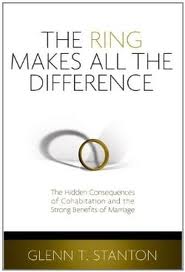Like so many moral debates, the field is large in this question of cohabitation. Narrowing the focus to just one of the arguments and getting specific may help in this regard. So while there are serious implications in the areas of theology, morals, psychology, and civic duties, the focus of this session is simply on the economic argument. Many today determine life choices almost solely based on the practical question of “which option is most financially beneficial.”
This matter of financial benefits has become a basic argument for cohabitation. Many will argue that it is cheaper to just live together than to actually get married. The following two articles provide differing views on this specific question.
Why Get Married At All? Finances and Cohabitation
By Trent March (Source)
[In the past], I wrote an article discussing reasons why the idea that men shouldn’t get married for financial reasons was false. In the article, I pointed out several purely financial reasons for men to get married, reasons that applied very well to women as well.
Many people responded with the great point that many of the benefits described in that article are also applicable to people who cohabitate. This is absolutely true. The benefit of reducing the cost per person for rent, energy, and so on occur when people are simply roommates, regardless of their relationship. Also, simply cohabitating instead of actually being married also avoids some of the negatives of marriage, such as legal entanglement.
However, there are several specific economic benefits to marriage over cohabitation that, when considered together, paint a positive economic view of marriage.
First, being married means you have the right to receive property settlements and support in the event of divorce. If you’re cohabitating, your partner is on the lease, and you suddenly find all of your stuff tossed out in the yard, your options are pretty limited. If you’re relying on your partner to support you and he or she tells you to get out, you’re completely on your own.
Second, being married means the ability to obtain family health, dental, and other insurance benefits. The exact rules on this vary from state to state, but generally it is much more difficult to obtain insurance through your partner’s employment if you are not married. Being able to obtain that insurance reduces the cost of insurance for both members of the household and often allows one member to take on a challenging (and often lucrative) alternative career path.
Third, being married means receiving your partner’s property in the event of death without a will (and even with an incomplete will). The presence of a spouse greatly simplifies the resolution of a person’s estate, as the spouse virtually always takes the property. If the cohabitants are not married, the door is open to a great deal of legal wrangling. One only needs to take a peek at the battle over Stieg Larsson’s estate for a clear example of what I’m talking about.
Fourth, being married means receiving survivor’s benefits from retirement plans and Social Security. If your partner dies before you and you’re married, you’re likely to continue receiving some benefit from his retirement and Social Security. If you’re unmarried, you don’t get any of these benefits.
Simply put, cohabitation certainly gives some of the same financial benefits of marriage as opposed to living single, but it does not confer all of the benefits.
Now, are there advantages to simple cohabitation over marriage? If you approach the relationship as though an end to the relationship is expected at some point, cohabitation is superior to marriage in many respects. In effect, smart cohabitants would function just like roommates, with clearly delineated finances and possessions, so that there are minimal issues if the relationship fractures.
In my eyes, danger enters the picture when cohabitants begin to share more and more things of financial consequence. When you begin to co-sign for loans and for utilities, you’re creating a serious financial challenge in the event of a messy breakup without clear rules to follow. Even more challenging is a cohabitation situation with a child involved. Cohabitation agreements can resolve some of this, but they have limited legal backing.
Simply put, I strongly encourage people not to financially bind themselves to each other unless they are entering into a legally married state. Such actions include cosigning for loans, co-ownership of major possessions, and having children. The drawbacks and challenges of disentanglement if one partner chooses not to be cooperative during a breakup (that would never happen, right?) aren’t worth it.
The Strange Economics of Cohabitation
By Belinda Luscombe (Source)
Conventional wisdom says that two can live together as cheaply as one. Conventional wisdom is, as usual, a little off. Studies indicate that two can actually live together about 1.4 times as cheaply as one. And new research suggests that a lot depends on who those two are, and what their living arrangement is.
While college graduates who live together have a higher median household income than those who are married or single, the opposite is true of high school graduates: high school–educated couples who live together but aren’t married have a lower median household income ($46,540) than those who are married ($56,800) and are brushing against those who live with no partner ($45,033).
For the college educated those numbers differ significantly, according to a new Pew Research Center analysis, which used a standard equivalence-scale methodology in order to compare households of different size on an equal basis. Those living together but not married had the highest household income ($106,400), followed by the married ($101,160) and the single ($90,067).
Cohabitation, as sociologists call living together, while still not as mainstream in the U.S. as in some European countries, has become increasingly popular in the last decade. According to the Pew report, which used data from the 2009 American Community Survey conducted by the Census Bureau, the proportion of 30-to-44-year-olds living together has almost doubled since 1999, from 4% to 7%.
It’s a small percentage, but the image of a husband carrying his wife over the threshold for the first time as they start their life together is practically a cave painting relative to the modern picture of marriage. The majority of people have lived with a member of the opposite sex (the study did not weigh in on same sex couples) before they were married. Fifty-eight percent of women aged 19 to 44 had ever cohabited in data collected in 2006-08, while in 1987 only 33% had.
Cohabitation is much more prevalent among those with less education. “Among women ages 19 to 44, 73% of those without a high school education have ever cohabited, compared with about half of women with some college (52%) or a college degree (47%),” note the Pew study’s authors, Richard Fry and D’Vera Cohn.
But while those with the least education and economic means are the most likely to live together, they are the ones who seem to benefit least from the economies of scale offered by partnering up.
The Pew researchers present several explanations for why cohabiting seems to benefit the college educated financially more than marriage does, and why the same doesn’t hold true for their peers with less education:
• College-educated couples were less likely to have children in the house if they were cohabiting than if they were married. There was also a higher likelihood that both partners were working.
• Non college-educated unmarried couples were more likely to have children than college-educated married couples.
• College-educated cohabiters are more likely to marry within three years of moving in together than couples with less education and may use different, more efficient money management systems, such as pooling their resources.
Of course, it may not be marital status that is making the difference. As sociologist Andy Cherlin has pointed out, it’s not that marriage makes the less-educated wealthier, it’s that they tend to wait until they’re a little wealthier to get married. Marriage is less a part of their life plan as a trophy for financial independence.
This does not seem to be true for cohabitation. An earlier Pew survey asked couples whether they had moved in together partly for financial reasons, and only a third said money had played any role. Moreover education made no difference in the way the question was answered.
Sociologist Dalton Conley thinks selection criteria also play a big role in these figures. “I think it’s because among the college educated, cohabitation is a practice of the elite who tend to live in high-cost, high-salary areas on the East and West coasts,” says Conley, dean of social sciences at New York University. “Whereas you’re more likely to find non college-educated cohabiters in the rest of the country where salaries are lower.”











